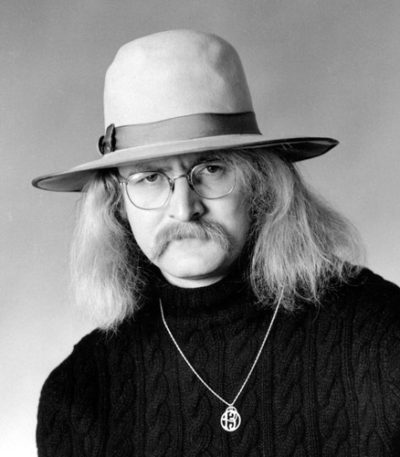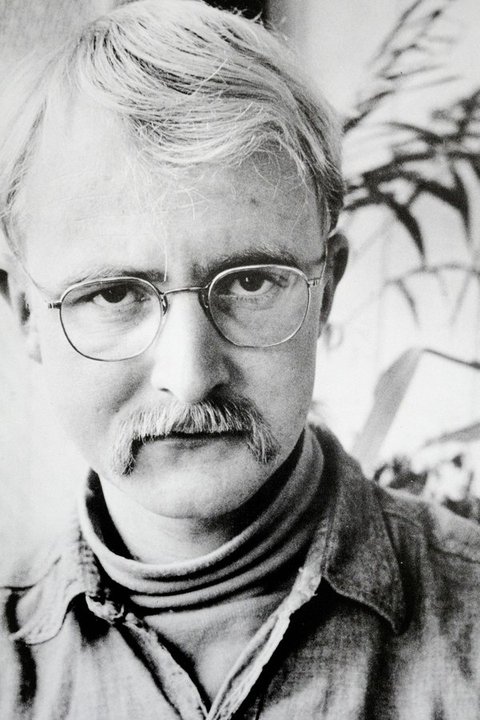Richard Brautigan (Richard Gary Brautigan)

In San Francisco, Richard Brautigan sought to establish himself as a writer. He was known for handing out his poetry on the streets and performing at poetry clubs. In early 1956, Brautigan typed a three-page manuscript and sent it to The Macmillan Company for publication. The manuscript consisted of two pages with 14 poems and a page with the dedication “for Linda”. Of the poems, only “stars” and “hey” were titled. In a letter dated May 10, 1956, Macmillan rejected the manuscript, stating, “… there is no place where it will fit in”. In 2005, the X-Ray Book Company published the manuscript as a chapbook titled Desire in a Bowl of Potatoes. Brautigan’s first poetry book publication was The Return of the Rivers (1957), a single poem, followed by two collections of poetry: The Galilee Hitch-Hiker (1958) and Lay the Marble Tea (1959). During the 1960s Brautigan became involved in the burgeoning San Francisco counterculture scene, often appearing as a performance-poet at concerts and participating in the various activities of The Diggers. He contributed several short pieces to be used as broadsides by the Communication Company. Brautigan was also a writer for Change, an underground newspaper created by Ron Loewinsohn.
In the summer of 1961, while camping in southern Idaho with his wife and daughter, Richard Brautigan completed the novels A Confederate General From Big Sur and Trout Fishing in America. A Confederate General from Big Sur was his first published novel and met with little critical or commercial success. But when Trout Fishing in America was published in 1967, Brautigan was catapulted to international fame. Literary critics labeled him the writer most representative of the emerging countercultural youth-movement of the late 1960s, even though he was said to be contemptuous of hippies. Trout Fishing in America has sold over 4 million copies worldwide. During the 1960s Brautigan published four collections of poetry as well as another novel, In Watermelon Sugar (1968). In the spring of 1967 he was Poet-in-Residence at the California Institute of Technology. During this year, he published All Watched Over by Machines of Loving Grace, a chapbook published by The Communication Company. It was printed in an edition of 1,500 copies and distributed free. From 1968 to 1970 Brautigan had 23 short pieces published in Rolling Stone magazine. From late 1968 to February 1969, Brautigan recorded a spoken-word album for The Beatles’ short-lived record-label, Zapple. The label was shut down by Allen Klein before the recording could be released, but it was eventually released in 1970 on Harvest Records as Listening to Richard Brautigan.
In the 1970s Richard Brautigan experimented with literary genres. He published five novels (the first of which, The Abortion: An Historical Romance 1966, had been written in the mid-1960s) and a collection of short stories, Revenge of the Lawn (1971). In 1974 The Cowell Press collected seven of his broadside poems into the book Seven Watermelon Suns. The limited edition of ten copies included embossed color etchings by Ellen Meske. “When the 1960s ended, he was the baby thrown out with the bath water,” said his friend and fellow writer, Thomas McGuane. “He was a gentle, troubled, deeply odd guy.” Generally dismissed by literary critics and increasingly abandoned by his readers, Brautigan’s popularity waned throughout the late 1970s and 1980s. His work remained popular in Europe, however, as well as in Japan, where Brautigan visited several times. To his critics, Brautigan was willfully naive. Lawrence Ferlinghetti said of him, “As an editor I was always waiting for Richard to grow up as a writer. It seems to me he was essentially a naïf, and I don’t think he cultivated that childishness, I think it came naturally. It was like he was much more in tune with the trout in America than with people.” Richard Brautigan’s writings are characterized by a remarkable and humorous imagination. The permeation of inventive metaphors lent even his prose-works the feeling of poetry. Evident also are themes of Zen Buddhism like the duality of the past and the future and the impermanence of the present. Zen Buddhism and elements of the Japanese culture can be found in his novel Sombrero Fallout: A Japanese Novel. Brautigan’s last publication before his death in 1984 was his novel So the Wind Won’t Blow It All Away, published in 1982.
On June 8, 1957, Richard Brautigan married Virginia Dionne Alder in Reno, Nevada. The couple had one daughter together, Ianthe Elizabeth Brautigan, born on March 25, 1960, in San Francisco. Brautigan’s alcoholism and depression caused him to become increasingly abusive[15] and Alder ended the relationship on December 24, 1962, though the divorce was not finalized until July 28, 1970. Brautigan continued to reside in San Francisco after the separation, while Alder settled in Manoa, Hawaii, and became a feminist and an anti-Vietnam War activist. Brautigan remarried on December 1, 1977, to the Japanese-born Akiko Yoshimura, whom he met in July 1976 while living in Tokyo, Japan. The couple settled in Pine Creek, Park County, Montana, for two years. Brautigan and Yoshimura were divorced in 1980. Brautigan had a relationship with a San Francisco woman named Marcia Clay from 1981 to 1982. He also pursued a brief relationship with Janice Meissner, a woman from the North Beach community of San Francisco. Other relationships were with Marcia Pacaud, who appears on the cover of The Pill Versus the Springhill Mine Disaster; Valerie Estes, who appears on the cover of Listening to Richard Brautigan; and Sherry Vetter, who appears on the cover of Revenge of the Lawn. Richard Brautigan was an alcoholic throughout his adult life and suffered years of despair; according to his daughter, he often mentioned suicide over a period of more than a decade before ending his life.
In 1984, at age 49, Richard Brautigan had moved to Bolinas, California, where he was living alone in a large, old house that he had bought with his earnings years earlier. He died of a self-inflicted .44 Magnum gunshot wound to the head. His decomposed body was found by Robert Yench, a friend and private investigator, on October 25, 1984. The body was found on the living room floor, in front of a large window that, though shrouded by trees, looked out over the Pacific Ocean. Due to the decomposition of the body it is speculated that Brautigan had ended his life over a month earlier, on September 16, 1984, days after talking to friend Marcia Clay on the telephone (neighbors heard a loud noise that Sunday while watching an NFL game[16]). Brautigan was survived by his parents, both ex-wives, and his daughter Ianthe. He has one grandchild named Elizabeth, who was born about two years after his death. According to Michael Caines, writing in the Times Literary Supplement, the story that Brautigan left a suicide note that simply read: “Messy, isn’t it?” is apocryphal. Ianthe Brautigan has confirmed that her father did not leave such a message. Brautigan once wrote, “All of us have a place in history. Mine is clouds.”
Born
- January, 30, 1935
- USA
- Tacoma, Washington
Died
- September, 16, 1984
- USA
- Bolinas, California
Cause of Death
- gunshot wound
Other
- Cremated



